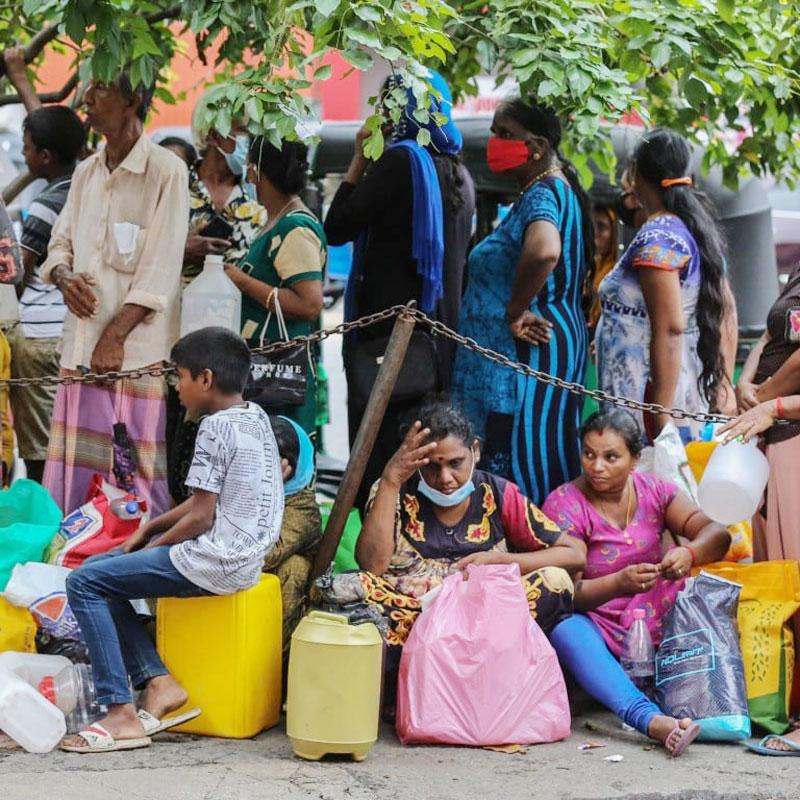Saturday Feb 14, 2026
Saturday Feb 14, 2026
Thursday, 5 October 2023 00:10 - - {{hitsCtrl.values.hits}}

A comprehensive program to revitalise the country’s economy is imperative
|

The entire country is now aware of recent developments; a delegation came to assess the progress of an agreement and conveyed the impossibility of specifying a release date for the second IMF instalment.
Regardless of the rhetoric, the second instalment will eventually materialise, as the IMF seeks program success following the initial disbursement. The IMF’s concerns do not encompass the country’s political turbulence, media suppression, or Government’s anti-democratic stance. Opposition inquiries regarding these issues have been met with the standard response that they fall outside the IMF’s mandate.
What we see unfolding is a Government willing to undertake the seemingly impossible without negotiations. It’s clear that the IMF also recognises the impracticality of fulfilling all the promises at once, leading to a teasing situation.
The core question
Beneath the surface lies a fundamental question: Is the Government’s adherence to IMF advice the right path?
Historically, the Government had portrayed the International Monetary Fund as the sole solution to Sri Lanka’s problems. Notably, this viewpoint was shared not only by the Government but also by certain economic experts from the main opposition.
Negotiations with the IMF commenced only last March, driven by a severe foreign exchange crisis and queues for essential commodities. In response, the President appointed a competent lawyer, not necessarily an economic expert, as the Minister of Finance. To aid him, two former IMF officials, still receiving pensions from the IMF, were appointed as the Governor of the Central Bank and the Secretary of the Treasury.
Within days of their appointment, they declared the country bankrupt without parliamentary notification, raising questions about the decision’s procedural validity. However, complex political circumstances in the ensuing months deterred extensive debate on the issue, bolstered by the vigorous defence of the decision by the lawyer minister, who was widely respected for taking on the role during challenging times.
The IMF prescription
A significant consequence of declaring bankruptcy is the loss of legal room for any Government or institution to address the country’s financial woes. Consequently, seeking IMF assistance became the sole recourse after Sri Lanka’s bankruptcy declaration in April 2022.
Months of discussions with the IMF ensued, marked by an apparent absence of Government bargaining. President Ranil Wickremesinghe aimed to reach an agreement with the IMF without delving into the long-term ramifications.
During this period, a few independent MPs, distinct from the Government, perceived the impending dangers and endeavoured to raise awareness through media discussions, interviews, and lectures. However, their efforts garnered limited attention, both in the media and within the parliament.
The primary concern was not opposition to dealing with the IMF but rather apprehension about the Government’s inclination to accept IMF proposals without much scrutiny. The alignment of media space with the Government’s policies led the general public to believe that the IMF negotiations were proceeding more favourably than anticipated.
Subsequently, the IMF agreement garnered substantial parliamentary support, with only a handful of members voting against it.
Misdiagnosing the problem
The crux of the matter is that both the Government and the IMF have failed to identify the real issue. They have misconstrued the symptom as the root cause of the disease. This misunderstanding has given rise to the widely discussed solution of increasing taxes to augment Government revenue.
Where our perspective diverges significantly is in our belief that the insufficiency of the private sector’s contribution to the national economy is the actual problem, while low tax revenue is merely a symptom of this underlying issue.
For decades, economic development in the country has been gauged by Government investments and expenditures. While large-scale infrastructure projects were undertaken, Government spending surged, contributing to the calculation of the Gross National Product.
However, as the enormity of the debt burden came to light, the nation stood on the brink of bankruptcy. This prompted a hasty declaration of insolvency, leaving no alternative but to turn to the IMF for assistance.
The IMF’s prescribed solution
In initial discussions between IMF officials and Government representatives, the IMF presented a standardised solution, involving tax hikes, fee increments to cover expenses, fiscal restraint, State-owned enterprise divestitures, inflation control measures, and central bank independence. The IMF committed to providing a $ 2.9 billion loan over four years, contingent on Government compliance. The Government’s primary responsibility was to restructure $ 25 billion of debt in accordance with the IMF agreement.
The Government readily accepted these terms with minimal negotiation, even extending debt restructuring to the domestic arena. Consequently, the IMF had no grounds to withhold the first instalment.
Unfolding consequences
The aftermath of striving to fulfil these impractical promises is now unfolding. In recent times, the Government introduced numerous bills in parliament, obediently implementing IMF proposals. Tax burdens on both individuals and businesses were significantly heightened to boost Government revenue. Concurrently, interest rates remained high to combat inflation. Public investments, particularly in development projects, were curtailed, and welfare programs faced substantial cuts. To compensate for the losses incurred by Government institutions, prices of electricity, water, oil, bus fares, and train fares were raised. Preparations for the sale of profitable Government entities were made, although their actual sale remains uncertain.
This approach may appear acceptable to those without income constraints, viewing it from a capitalist standpoint. However, the Government’s responsibility in a country where 7 million out of 22 million people live in poverty cannot be understated. The supreme constitution emphasises the sovereignty of the people, with the Government existing to serve them. Questions inevitably arise about the functioning of a nation’s sovereignty when its citizens are struggling to afford basic necessities, and a significant portion of the population, including the youth, is leaving the country in search of better prospects.
The consequences of exorbitant charges for essential services, prolonged high-interest rates, and substantial tax hikes are evident in the economy’s performance. This is not mere political rhetoric but a stark reality confronting us all.
The fallout from the Government’s economic mismanagement has been significant, with hundreds of thousands of jobs lost. Industries that were once major sources of employment, such as construction, manufacturing, and apparel, have witnessed a sharp decline. The garment industry, for instance, has contracted by 18% this year alone, and the industrial sector shrank by 40% in the first quarter. Overall exports have declined by 12%.
In its quest to appease the IMF through tax hikes, the Government has left the working population in a precarious position. The budget aimed to increase relative tax revenue by 70% by 2022. While tax revenue in 2022 amounted to 1852 billion rupees, the anticipated figure for 2023 is 3130 billion rupees, marking a 70% rise from the previous year.
However, this target is highly implausible. The limited expansion of the tax base means that the increased tax burden will predominantly fall on the same taxpayers as in 2022. Consequently, the available income for taxpayers to meet their needs has diminished by a substantial 70%.
Today, a significant portion of individuals’ income is allocated to basic necessities. Even with reduced expenditure on food, there is insufficient financial room for other essentials, including education, healthcare, clothing, housing, investments, and entrepreneurial ventures.
The result is a decrease in money circulation within the country, leading to reduced demand across various sectors. Companies experience losses and are forced to implement layoffs, resulting in hundreds of thousands of job losses.
This cycle of economic decline persists, with the economy contracting for six consecutive quarters, experiencing an 11% decline in the first quarter of 2023.
Facing unbearable tax burdens and a bleak outlook for their children, professionals are emigrating from the country in substantial numbers.
In the first half of 2023 alone:
Consequently, the nation is losing its invaluable human resources.
This exodus of talent due to excessive taxation and lack of opportunities underscores a pressing question: Will there be any capable individuals left to lead the country toward a brighter future?
A creative approach needed
In light of this critical situation, the Government must think innovatively, free from the constraints of the IMF’s prescription. A comprehensive program to revitalise the country’s economy is imperative. We have consistently presented our solutions, yet it appears that the Government remains unresponsive to our proposals.
(The writer is a Member of Parliament.)